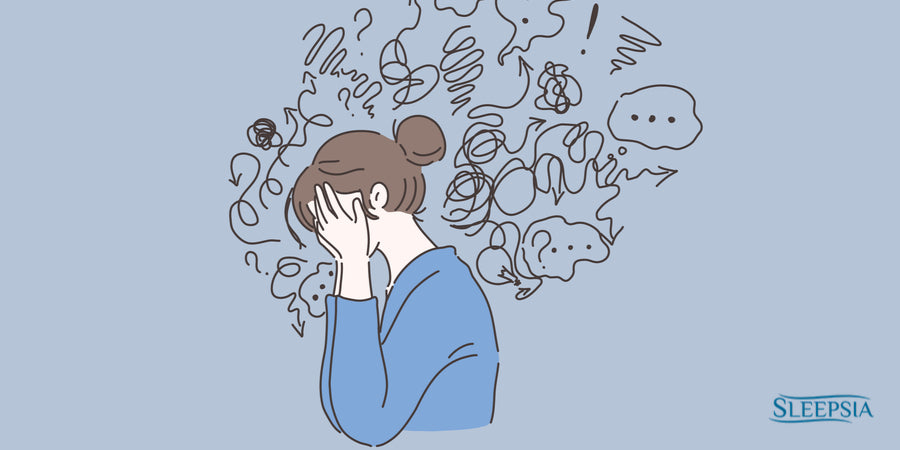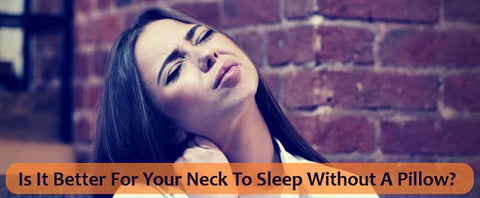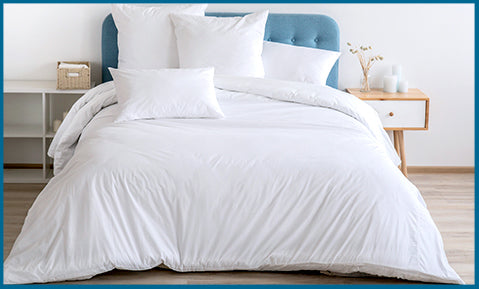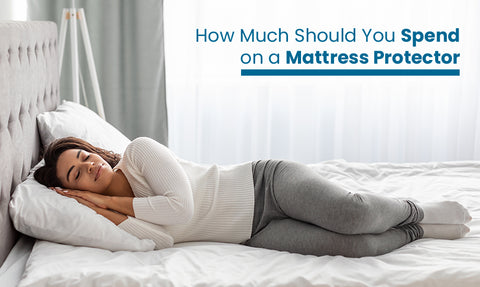
As anxiety activates the brain and keeps us in a fight-flight-freeze response, it impedes and interrupts sleep, causing insomnia and excessive daytime sleepiness.
It initiates a negative cycle in which many people across the world are caught up.
Let’s learn more about how anxiety affects sleep and what you can do about it:
What is Anxiety?
According to American Psychological Association, anxiety can be described as “an emotion characterized by feelings of tension, worried thoughts and physical changes like increased blood pressure.”
Normal Anxiety
Anxiety is a normal response to danger. When we’re anxious, our body activates its fight-flight-freeze response to protect us from the danger.
Experts believe that anxiety helped humans survive during the prehistoric times by setting off alarms whenever a predator was nearby.
But in our modern society, we aren’t afraid of running into large animals. However, the perception of danger still lurks and is often related to:
- Work
- Money
- Family
- Health
- Relationships
- Social interactions
On perceiving a nearby danger, our body releases adrenaline, which:
- Activates the fight-flight-freeze response
- Increases the heart rate
- Increases blood pressure
- Enlarged pupil
- Increases air passage to the lungs
- Alters body’s metabolism
Anxiety Disorders
Anxiety disorders are a more severe form of anxiety, often related to a stressor or a trigger. While the symptoms are similar to simple anxiety, they’re more severe.
If your anxiety recurs in a particular situation, then you may have an anxiety disorder. Getting it diagnosed must be a priority, as it can affect your quality of life.
Symptoms of Generalized Anxiety Disorder (GAD)
Generalized anxiety disorder generally presents the following symptoms:
- Irritability
- Heightened emotions
- Restlessness
- Difficulty with focus
- Decreased cognitive abilities
- Uncontrolled feelings of worry
While many people experience these symptoms at some point in their life, people with GAD experience them more frequently. Further, the symptoms are more distressing in those suffering from GAD.
And the symptoms aren’t only limited to emotions and mental health. Anxiety disorders can even impact the physical health of a person.
Types of Anxiety Disorders
DSM-V (diagnostic and statistical manual of mental health disorders) classifies anxiety disorders into the following types:
Generalized Anxiety Disorder
If you’re generally anxious about many things and events in life, then you may have generalized anxiety disorder.
People suffering from generalized anxiety disorder find it difficult to nail down the triggers of their anxiety.
Phobias
Phobias are irrational fears related to an event or object. Phobias usually have an identifiable trigger, differentiating it from generalized anxiety disorder.
Here are some common phobias:
- Agoraphobia: it’s more than fear of open spaces. People suffering from it sometimes have a fear of leaving their home, as they perceive the outside world as unsafe.
- Acrophobia: fear of height
- Claustrophobia: fear of closed spaces
- Hydrophobia: fear of water
Social Anxiety Disorder
Fear of judgement in a social situation is a common anxiety trigger. This is why many people are afraid of public speaking.
But social anxiety disorder brings on the symptoms of anxiety.
People with this disorder generally like to avoid social interactions, resulting in a lack of support structure and growth in life.
Relationship and Separation Anxiety
People with relationship anxiety often feel anxious when they perceive that their partner is going to leave them.
It’s not necessary that the partner may be distant. Simply the perception of distancing can cause symptoms of panic.
Similar Conditions
The previous edition of DSM-V included the following conditions under anxiety disorders:
Obsessive Compulsive Disorder
People with this condition obsess over thoughts and repeat actions. Despite knowing that the behavior is aberrant, people with this condition cannot stop the behavior.
Symptoms of obsessive compulsive disorder include:
- Obsession over thoughts
- Compulsively repeating actions
Acute Stress Disorder
Often occurring immediately after a traumatic event, acute stress disorder can lead to post-traumatic stress disorder.
Symptoms of acute stress disorder include:
- Negative mood
- Dissociation
- Arousal symptoms, such as insomnia
- Intrusion symptoms, such as flashbacks
Anxiety and depression are commonly associated with ASD.
Post-traumatic Stress Disorder
After experiencing a traumatic event, many of us feel helpless and fearful. However, in the long term, trauma can lead to:
- Flashbacks
- Insomnia
- Anxiety
- Depression
- Nightmares
- Irritability
- Heightened emotions
Over 90 percent of Vietnam veterans with PTSD reported sleep problems, such as insomnia, in multiple studies.
There are many other symptoms of PTSD. If you suffer from this condition, then you must seek help from a trained mental health professional.
Prevalence of Anxiety Disorders
The following table represents the prevalence of different types of anxiety disorders among adults in the United States:
|
Name of disorder |
Prevalence |
|
Specific phobia |
8 - 12 percent |
|
Social anxiety disorder |
7 percent |
|
Panic disorder |
2 - 3 percent |
|
Agoraphobia |
1 - 2.9 percent |
|
Generalized anxiety disorder |
2 percent |
|
Separation anxiety disorder |
0.9 - 1.9 percent |
Anxiety disorders affect around 25 percent of teenagers and 20 percent of adults in the United States each year.
Causes of Anxiety

As mentioned above, anxiety is often related to a particular trigger: event, object, relationship, etc.
Apart from these environmental stressors, the following may also cause anxiety:
- Health conditions: suffering from a particular disease or undergoing an intensive surgery can put a lot of stress on the mind, leading to symptoms of anxiety.
- Substance abuse: when addicted to a substance, it can be very stressful to come off it,
- Genetics: people with a family history of anxiety disorder are more likely to suffer from it as well.
- Neurotransmitter imbalance: an imbalance in levels of hormones, such as dopamine, serotonin, and neopheneprine, can lead to anxiety.
How Anxiety Affects Sleep?
Anxiety and sleep do have a relationship: a negatively proportional one.
The more anxious you’re at night, the less will be the quantity and quality of your sleep. And it’s not only you but also many other people who share the same problem.
Hyperarousal, such as one caused by anxiety, is a key factor behind insomnia. And high sleep reactivity is linked to depression and anxiety.
In fact, 50 percent of adults report that anxiety has a negative impact on their sleep, according to AADA (Anxiety & Depression Association of America).
Why does Anxiety Wake you up?
When your mind perceives danger, your body experiences an adrenaline rush to prepare itself to fend off any danger, waking you up in the process.
But the perception of danger is often false. It’s not a dangerous predator that is lurking around that brings on anxiety but a thought that overemphasizes or catastrophizes an event.
The Reverse Relationship
As a lack of sleep can affect mood, it can exacerbate symptoms experienced by people with anxiety disorders.
Treatment for Anxiety
Since it is clear that anxiety ruins your sleep, you should look at the following treatment options so that you can control triggers better and avoid the adrenaline rush that keeps you awake at night.
Psychotherapy
Cognitive behavioral therapy is the best option available to people suffering from an anxiety disorder. By helping you change your thought patterns, CBT creates positivity in your life and breaks negative thinking patterns that put you in a bad mood.
However, it takes time to change your thinking patterns. According to AADA, you may start seeing results after 12 - 16 weeks of CBT.
Medication
If you can’t control your negative thoughts or if anxiety is seriously affecting your life, then you can ask your doctor about medications that calm nerves and reduce anxiety.
In fact, medication can be complemented with psychotherapy for better results.
Here are some medications that your doctor may prescribe to treat your anxiety:
Benzodiazepines
These are sedatives meant to calm your body and mind. By relaxing your muscles and increasing the effects of certain neurotransmitters, these drugs decrease your levels of anxiety.
Here are a few popular benzodiazepines often prescribed for anxiety disorders:
|
Generic name |
Brand name |
|
Alprazolam |
Xanax |
|
Chlordiazepoxide |
Librium |
|
Clonazepam |
Klonopin |
|
Diazepam |
Valium |
|
Lorazepam |
Ativan |
Your doctor will likely use benzodiazepines for the short-term, since these drugs can cause problems with memory and balance.
Buspirone (Buspar)
Experts don’t actually know why these drugs work, but they believe that these drugs are able to alter chemicals in the brain that regulate mood.
Antidepressants
By affecting the levels of neurotransmitters in the brain, these drugs can regulate mood and treat symptoms of anxiety.
Antidepressants are of multiple types:
- SSRI (selective serotonin reuptake inhibitors): impact appetite, mood, memory, and sleep by altering the levels of serotonin in the brain.
- Tricyclics: work similarly to SSRI antidepressants.
Following SSRI antidepressants are used for treatment of anxiety disorders:
|
Generic name |
Brand name |
|
Escitalopram |
Lexapro |
|
Fluoxetine |
Prozac |
|
Paroxetine |
Paxil |
|
Sertraline |
Zoloft |
MAOIs (Monoamine oxidase inhibitors)
Mostly used to treat social phobias and panic disorders, MAOIs increase the levels of multiple neurotransmitters that regulate mood.
Note: MAOIs are used off-label to treat anxiety, as they’re approved by FDA only for treatment of depression.
In some countries, doctors prescribe Gabapentin for sleep and anxiety.
If you think that therapy isn’t working for you, then you can ask your doctor about medications for treatment of anxiety disorders.
Management Techniques for Anxiety
If you suffer from anxiety, then you should talk to a certified medical professional.
However, there are some techniques that can help calm your anxiety so that you can enjoy a good night’s sleep.
Immediate Relief Methods
These methods provide immediate relief from anxiety by shifting your focus from your thoughts. Whenever you feel anxious, use one of these tools to calm your mind.
4-7-8 breathing technique
By bringing your focus to your breath, this technique removes your focus from your thoughts. As thoughts are the main triggers of anxiety, this technique can really help you out during the day.
Here are the steps to practice the 4-7-8 breathing technique for anxiety:
- Inhale for 4 seconds.
- Hold your breath for the next 7 seconds.
- Exhale for the next 8 seconds.
- Repeat steps 1 to 3 until you feel relaxed.
You should practice this technique multiple times a day, especially when you feel anxious.
Grounding
Being a natural response to a perception of threat, anxiety disappears upon realizing that the threat isn’t real.
Grounding relies upon this principle. When you sense objects in your environment, your brain receives signals and concludes that there is no actual threat present.
Here’s an overview of the 5-4-3-2-1 grounding technique for anxiety.
Mindfulness Meditation
Mindfulness meditation practice can enhance your ability to ignore thoughts that provoke anxiety. Since stopping thoughts altogether isn’t an option, you need to get in the habit of not judging them.
When a thought impinges upon your mind and you judge it, you initiate a cycle in which one thought leads to another, consuming a lot of mental power.
Because of this, you may feel not only anxious but also drained.
So here’s how you can practice mindfulness meditation for sleep and anxiety:
- Sit down in a comfortable position.
- Bring the focus to your breath.
- Note any thought that comes to the mind, and bring your focus back to your breath.
Start small: begin with 5 minute sessions and increase the time each week by 5 minutes until you get to the point at which you feel calm throughout the day.
In a 2015 study, researchers found that mindfulness can significantly decrease anxiety and stress.
And it isn’t necessary to sit down to practice mindfulness for sleep and anxiety. You can lie down in your bed or amble around in a park while maintaining a focus on your breath. But this takes some getting used to.
So once you’ve practiced mindfulness for at least a few weeks, you can try it while walking around.
Journaling
If a thought occurs again and again, then take time to explore it.
You can employ the 5Ws and H framework:
- What event is this emotion or thought related to?
- When did I feel this way the first time?
- Where did the event take place? Is it something I made up or is it real?
- Who are the people involved with this event?
- Why does this thought keep recurring?
- How do I resolve this stressor?
To journal for anxiety, you may try other prompts to explore the thought or emotion more profoundly.
Note: if you’ve gone through a recent traumatic event, then you may want to look for professional help to expose yourself to these thoughts in a controlled manner.
Sleep Hygiene for Anxious People
People with anxiety must follow good sleep hygiene. Anxiety and sleep deprivation are closely linked. A lack of sleep heightens your emotions and leads to more anxiety.
Being prone to negative thoughts that arouse the mind, you must follow the tips provided below to help your mind and body relax.
Here are some sleep hygiene tips for people with anxiety:
- Create a to-do list for the next day: some people keep planning the next day in their mind. To stop this, you can simply create a to-do list, to get things off of your mind.
- Journal: you can simply journal about your day or practice gratitude.
- Read: light reading can help your mind focus and move your thoughts away from anxiety triggers.
- Avoid electronics: blue-light emitting devices hinder the release of melatonin, the sleep hormone.
- Practice relaxation techniques: in order to avoid anxious thoughts impinging on your mind before you go to sleep, practice relaxation techniques, such as the 4-7-8 breathing method.
You can also consume foods high in magnesium for better sleep when suffering from anxiety. Magnesium is a key ingredient in many hormones including melatonin, which relaxes the body and enables you to fall asleep.
You may even ask your doctor about melatonin supplements, with which you can create a consistent sleep routine.
Conclusion
Anxiety hinders sleep and damages your quality of life. So it’s important to deal with anxiety via management techniques. And if that fails, then you should seek help from a certified medical professional.












